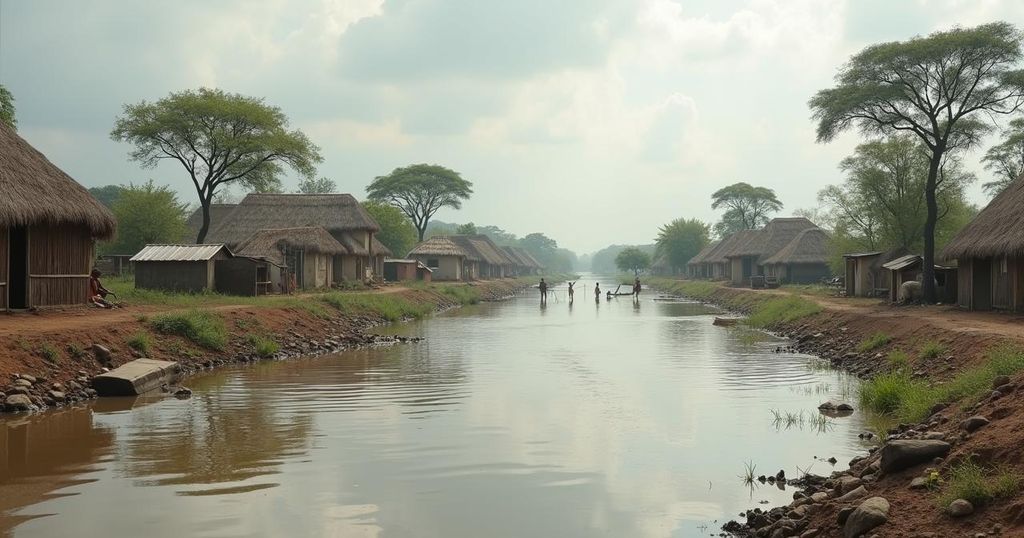Severe Flooding in South Sudan Displaces Over 241,000 as Crisis Worsens
Around 893,000 individuals are affected by severe flooding in South Sudan, with over 241,000 displaced. The floods have rendered vital supply routes impassable, leading to increased humanitarian needs amidst a backdrop of ongoing instability and conflict. The World Bank predicts that nearly nine million people in South Sudan will face critical needs in 2024 due to this disaster and broader challenges. Political paralysis further complicates the recovery efforts.
The recent flooding crisis in South Sudan has severely impacted approximately 893,000 individuals, leading to the displacement of over 241,000 people, as reported by the United Nations Office for the Coordination of Humanitarian Affairs (OCHA). According to OCHA, 42 of South Sudan’s 78 counties have been affected by these catastrophic floods, with heavy rainfall rendering 15 critical supply routes impassable. Consequently, a significant number of individuals are seeking refuge on elevated terrain to escape the surging waters. The regions of Unity and Warrap in northern South Sudan account for a substantial proportion—over 40 percent—of those affected by the flooding. Despite gaining independence from Sudan in 2011, South Sudan continues to grapple with a myriad of challenges, including chronic instability, violence, and economic hardships, compounded by climate-related disasters such as droughts and floods. A report from the World Bank highlighted that the ongoing flooding exacerbates an already dire humanitarian crisis characterized by severe food insecurity, economic decline, ongoing conflict, and various health crises. It is anticipated that nearly nine million individuals, including refugees, will confront critical humanitarian needs in 2024. Further complicating the situation, over 797,000 refugees have fled into South Sudan from Sudan due to conflict, with approximately 80 percent being South Sudanese returnees. Moreover, South Sudan is experiencing significant political stagnation, as the presidential office has announced yet another extension of the transitional period established under a 2018 peace agreement, effectively delaying elections initially scheduled for December by an additional two years. Many essential elements of the transitional framework remain unaddressed, including constitutional development and the unification of opposing military factions led by President Salva Kiir and former Vice President Riek Machar. This political indecision has been a source of frustration for both the populace and international observers. Nicholas Haysom, the chief of the UN mission in South Sudan, expressed concerns regarding the widespread disillusionment among the South Sudanese people, emphasizing the need for clear signs of commitment from the nation’s leadership towards a democratic future. Despite South Sudan’s abundant oil resources, the nation’s revenue stream suffered a significant blow following damage to an export pipeline during ongoing conflicts in neighboring Sudan early February.
The flooding crisis in South Sudan has arisen amidst an already fragile humanitarian landscape marked by instability, violence, economic challenges, and adverse climate conditions. Since its independence from Sudan in 2011, South Sudan has faced ongoing strife, including a plethora of humanitarian issues exacerbated by natural disasters. Climate change has rendered the nation particularly vulnerable, contributing to extreme weather events that disrupt livelihoods and exacerbate food insecurity. The potential for further deterioration in conditions is underscored by the influx of refugees from Sudan, increasing the strain on South Sudan’s resources and infrastructure. The political situation remains complicated, with delayed elections and unmet provisions from the 2018 peace agreement further complicating efforts to stabilize and unite the nation.
In conclusion, South Sudan faces a profound crisis as the recent floods have displaced a significant number of its citizens while affecting hundreds of thousands more. The situation is exacerbated by a precarious humanitarian landscape that includes violence, economic downturn, and an influx of refugees. Political stagnation and failure to address transitional agreements further complicate recovery efforts. Addressing these challenges will require immediate international assistance and commitment from South Sudan’s leaders to pursue a cooperative and democratic future.
Original Source: www.france24.com




Post Comment